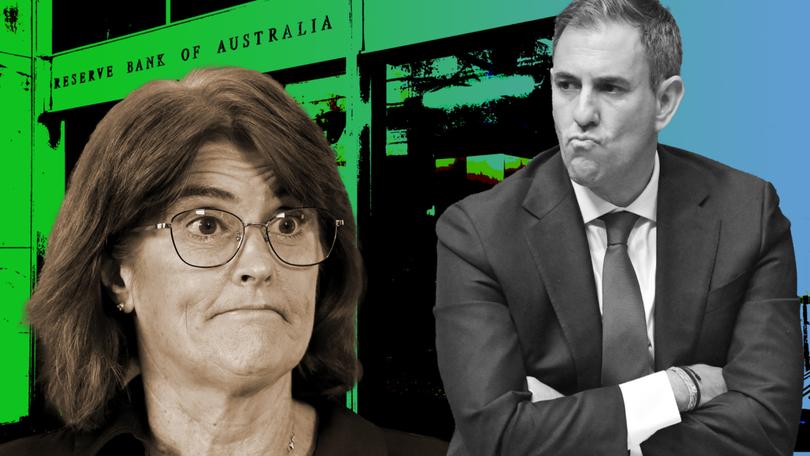Reserve Bank: Greens and Labor seal 11-hour deal to shake up central bank structure
A shake-up of the Reserve Bank looks set to pass the Senate after an eleventh-hour deal between Labor and the Greens that will keep a special power for the treasurer to overrule interest rate calls.

A shake-up of the Reserve Bank looks set to pass the Senate after an 11-hour deal between Labor and the Greens that will keep a special power for the treasurer to overrule interest rate calls.
The two parties nailed a broader agreement which includes $500 million of funding for social housing and support for the Federal Government’s Future Made in Australia manufacturing subsidy program.
The RBA reform will split the board into two expert panels — one for governance and one for interest rates — following a major review of the central bank released last year.
Sign up to The Nightly's newsletters.
Get the first look at the digital newspaper, curated daily stories and breaking headlines delivered to your inbox.
By continuing you agree to our Terms and Privacy Policy.The changes had been parked until the final sitting day of Parliament on Thursday, with the Greens successful in a bid to keep the rules allowing the treasurer to overrule the RBA’s decisions.
Scrapping that never-used power was the first recommendation of the March 2023 RBA review.
The agreement will also keep an existing provision for the Reserve to direct lending activities by banks.
Greens treasury spokesman Nick McKim said he was “relieved to see the Treasurer agreed to retain the power to cut interest rates”.
Shadow treasurer Angus Taylor said “Labor has done a dirty deal with the Greens to rush through legislation without scrutiny”.
“That includes . . . legislation to sack and stack the Reserve Bank board, confirming Labor speaks as one with the radical Greens on economic policy.
“The Greens in their dissenting report on the legislation have called monetary policy a perversity and accused the Reserve Bank of practising neo-feudalism. That’s who the Treasurer aligns with.”
But opposition had been wider. Former Liberal Treasurer Peter Costello reportedly said in February that the ability for the Government to veto rate calls should stay.
Earlier on Thursday, Finance Minister Katy Gallagher revealed on ABC radio that the Government was willing to make the concession.
“The Coalition have said no,” Ms Gallagher said.
“The Greens have been clear in earlier months about some of the amendments they would want to see . . . the ability for the treasurer to override decisions, which is essentially the stratus quo.
“They’re the discussions that we’ve been having.
“We would like that bill through.”
The RBA review had said it was “critical Australia retains the operational independence of the RBA”, adding that keeping a special power for the treasurer would undermine the central bank’s credibility.
“Monetary policy decision-making must be insulated from short-run political considerations,” the paper said.
The RBA was made independent in the 1990s after decades of experience showed political influence over interest rates led to short-term decisions which risked higher inflation. Despite the broader drive for autonomy, the treasurer retained capacity to overrule RBA moves.
It followed a pro-longed inflation cycle through the 1970’s that was only resolved through double-digit interest rates more than a decade later.
The ability for politicians to influence central bankers was put into sharp relief in the recent election race in the US.
President-elect Donald Trump has feuded with US Federal Reserve boss Jerome Powell over interest rate calls and talked up his potential influence over decisions.
But Mr Powell has fought back, arguing he could not be forced out.
